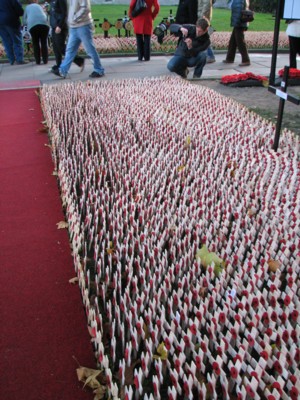EU Referendum has a long and detailed article on the problems the British Army is having with its equipment in the Middle East and the lessons that could and should be learned from other forces, such as the Canadians. The EU Ref. blog has become a regular read for me, and it specialises on two or three consistent themes and sticks to them solidly. You will not get closely-argued analysis of the armed forces like this unless you buy a specialist book or attend a lecture by military historians such as John Keegan. First class stuff all round.
|
|||||
|
There seems no end to the absurdity of US planners as to the conduct of the war in Afghanistan… surely the way to victory in all military conflicts is the unswerving pursuit of a single core objective (in this case the destruction of the Taliban and its power base) with ruthlessness and focus. Yet what do we see? A demented conflation of the entirely justified war against the sponsors of the 9/11 attack on New York and Arlington, with the preposterous ‘war on drugs’. At a stroke, attacking the income of Afghan farmers and warlords alike thereby more or less guaranteeing that these people will make common cause with the Taliban on the basis that the enemy of my enemy is my friend.
This has everything that a Samizdata quote of the day should have. It is about a beauty queen. It is not just something said by or about some dreary politician. Plus, guns are involved. But: Is this decision evidence that Israel is going soft, or does it display a fine understand of the balance that must always be struck between the needs of national defence and the need not to damage that which is being defended? Today is Remembrance Sunday, and outside Westminster Abbey there is a Field of Remembrance. The field’s crop consists of young men, each commemorated by a wooden cross. I took photographs there last Thursday. The most effective pictures for evoking what it all looked like were those which hinted at the sheer number of wooden crosses, which in their numbers of course only hinted in their turn at the number of young men killed in war in recent decades.  Who, I wonder, is that particular young man, who was, like me, taking photos? Probably, also like me, just going for an effective shot, rather than remembering anyone in particular. He is (as I later did in the exact same spot) photographing the backs of the crosses nearest to him. The nameless dead. Other photographers focused tightly in on one particular name and one particular cross. The oddest photograph I took that day was of a car number plate, on what looked like an official, government, chauffeur-driven Rolls.  At any other time, and with no poppies on the front, that would be a good laugh. But with poppies everywhere, it seemed very peculiar. Here, alas, is another relevant BBC story. This reports states that Britain’s armed forces are considered to be below strength for the tasks they have been ordered to perform. Nothing very surprising about that, given that although Blair has been almost indecently keen to deploy troops, sailors and airmen to various theatres of operations, he has not backed this up with a corresponding deployment of resources. As a minimal statist rather than an anarcho-capitalist libertarian, I accept that providing for the defence of this country is a basic task of the state, but that of course leaves wide open how exactly that task is carried out, by whom, and at what cost. Does it mean things like standing armies, or navies, or large airforces, or anti-missile batteries dotting the coasts? Does it mean an armed citizenry called upon to defend the nation at short notice? Does it mean getting into alliances with other powers to share this role, or focusing entirely on one’s own resources? It is Friday and we like a good debate ahead of the weekend. Let the comments fly! Try not to get hurt. The occasions where I am prepared to wade in on the side of a bunch of a civil servants are as rare as hen’s teeth but this one is truly no contest:
In other words, the standard operating procedure of the MSM. The stink is now so bad that it is finally getting in to some very lofty nostrils. And the reason? Simple, the USA has banned Vegemite! I expect to see RAAF strikes on US targets by late this evening and Aussie SAS teams boarding US shipping and dumping cargoes of Skippy Peanut Butter into the sea. More seriously, it is just preposterous that the state interferes in the most picayune aspects of life. Next time I am in the US I intend to smuggle a jar in disguised as Marmite and smear it over the door handles of the first US federal government building to see. There is an excellent bit of reportage in The Guardian by James Meek, covering the experiences of British troops in Southern Afghanistan that gives a good troop’s eye view of things. One of the things that struck me, reading the comments on the recent thread about the casualty toll in Iraq, the North Korean bomb test, and the ongoing debate about what to do about Islamist terror, is what are countries doing to defend against missile attacks, including nuclear ones? When George Bush was first elected in 2000 (whatever Michael Moore might claim), he made a great deal of play about missile defence and the ABM Treaty. Now I may have missed something, but anti-missile defence, as a topic, seems to have gone a bit quiet. But surely, if North Korea has the bomb, with Iran not far behind, then anti-missile defence ought to be one of the top priorities for defence planners. Even if you are a paleo-libertarian who thinks defence policy rules out any form of pre-emption, you presumably – unless you are a pacifist – embrace technologies to ward off attacks. So it seems to me to be a bit strange that we have not had more discussion about what countries should be doing in this area, and the pros and cons of the technologies involved. (There may have course have been a lot of discussion, but it has been out of the media spotlight, for various reasons). Some old thoughts of mine about the merits and perils of pre-emption. Here is a book about what a defence policy that is really about self-defence might look like, via the Independent Institute. I love the Science Museum in London, and there is another good reason to go there: it has an exhibition about the Spitfire fighter aircraft. Here is a nice review of it at the Social Affairs Unit blog.  Do not believe the nonsense about how the RAF was not essential to preventing an invasion of Britain in 1940. It was vital, and it seems morally right somehow that the aircraft that helped to nail the Luftwaffe was not just a brilliant piece of engineering, but also drop-dead gorgeous. Who would not sympathise with injured soldiers, forced to endure poor conditions and MRSA at Selly Oak Hospital in Birmingham. Now one has been threatened by a local Muslim:
Soldiers are concerned about their safety. In such matters, one expects the usual response from government: a statement that refuses to acknowledge the problem and masks neglect:
We know where they would like to end up:
The black humour of the British Tommy! No wonder New Labour hates them. UK military authorities are claiming the Taliban in Southern Afghanistan has been ‘tactically defeated’, which can mean quite a variety of different things. Certainly the accounts of what has been going on there indicate bloody hard fighting down to bayonet range on occasion and given the lack of resources at their disposal, any significant victory against the casualty insensitive Taliban reflects rather well on the British Army. Now if only the UK government would get rid of some of the many utterly pointless government departments, say for starters the Department of Trade and Industry and the truly preposterous Department of Culture, Media and Sport), we could spend more on the military and still reduce the level of taxation. Well, one can wish… |
|||||

All content on this website (including text, photographs, audio files, and any other original works), unless otherwise noted, is licensed under a Creative Commons License. |
|||||


